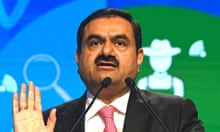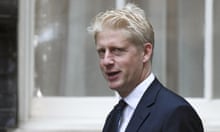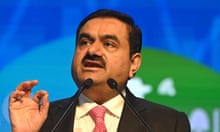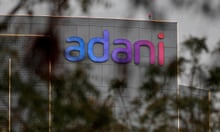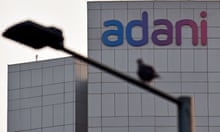Rahul Gandhi has said India’s “global reputation is on the line” and demanded that the prime minister, Narendra Modi, opens a parliamentary investigation after the Guardian revealed years of alleged financial violations by the politically connected Adani family.
Speaking at a press conference on Thursday, the most prominent figure in India’s opposition Congress party held aloft a copy of the Guardian article detailing how Adani family associates had appeared to use opaque offshore funds to secretly invest hundreds of millions of dollars into shares of their own Adani Group companies, one of the most powerful conglomerates in India.
The report was based on documents obtained by the Organised Crime and Corruption Reporting Project and shared with the Guardian and the Financial Times. Gandhi demanded that a parliamentary investigation took place into the Adani Group immediately.
Gandhi said: “Why is this one gentleman who is close to the prime minister, allowed to move [hundreds of millions] of dollars to pump up his share price and to use the money to capture Indian assets such as airports and ports?”
Modi is known to have a relationship with the founder of the Adani Group, Gautam Adani, which goes back 20 years. Though Adani has denied any favourable treatment, since Modi was elected in 2014 the conglomerate has expanded to become one of the largest in India – with monopolies over everything from power and ports to coal and airports – and has been awarded some of the largest and most lucrative state infrastructure contracts.
“I don’t understand why the prime minister is not forcing an investigation,” said Gandhi. “Why is he quiet? Why doesn’t he say that he is going to make sure that this issue is investigated?”
With India holding the G20 presidency, and due to host the leaders’ summit next weekend, where Rishi Sunak and Joe Biden will be among the attendees, Gandhi said the Adani revelations called into question the transparency and integrity of India’s financial and economic systems at a time when the country was declaring itself open for global business.
In a statement released on Thursday morning, the Adani Group said it rejected the reports “in their entirety”. It said: “We have complete faith in the due process of law and remain confident of the quality of our disclosures and corporate governance standards.” The Modi government gave no response to the allegations.
The share price of all Adani enterprises was down on Thursday after the reports, falling collectively by 3.3%, amounting to losses of $4bn (£3.2bn) for the conglomerate.
The relationship between the Modi government and Adani was first thrown into the political spotlight in January, after the release of the Hindenburg report by a New York firm, which accused the Adani Group of the “biggest con in corporate history”, including share price manipulation.
In a lengthy rebuttal, the Adani Group denied all the Hindenburg allegations as “baseless” and an attack on India.
In response to the Guardian’s allegations, the Adani Group said they were “nothing but a rehash of unsubstantiated allegations levelled in the Hindenburg report. Our response to the Hindenburg report is available on our website. Suffice it to state that there is neither any truth to nor any basis for making any of the said allegations against the Adani Group and its promoters and we expressly reject all of them.”
Gandhi had first begun questioning Modi on his government’s links to Adani and staged a parliamentary walkout after Hindenburg. But just a few weeks later, Gandhi was found guilty in a defamation case and sentenced to two years in prison – a case he alleged was politically motivated for raising the Adani issue. Gandhi was automatically disqualified as a politician. Nevertheless, last month his sentence was suspended by the supreme court and he returned as an MP.
The Guardian also revealed that back in early 2014, financial regulator the Securities and Exchange Board of India (Sebi), had been given information by another government agency that the Adani Group might be involved in suspicious stock market activity. But after Modi was elected a few months later, the investigation disappeared and has not been recorded publicly since.
In the aftermath of the Hindenburg report, Sebi was tasked with investigating the Adani Group, but has yet to release its findings.
Saket Gokhale, an MP for opposition party Trinamool Congress, said on Thursday he had written to the Sebi chair demanding an urgent investigation into the allegations against Adani.
Congress party leaders have alleged that India’s financial regulatory and investigative agencies have become “toothless” and reduced to “political tools” under the Modi government.
“This only goes to show that our institutions failed and rules were violated under their nose,” said Jairam Ramesh, general secretary of the Congress party.

